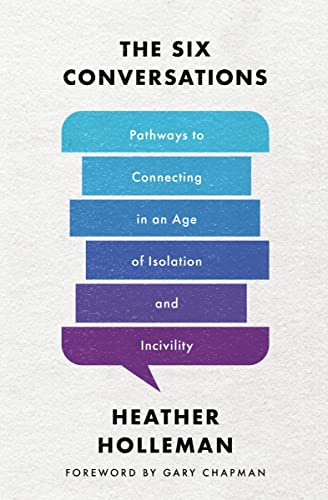

Continuing Conversations Matter, reflecting on THE SIX CONVERSATIONS: Pathways to
Connecting in an Age of Isolation and Incivility by Heather Holleman.
In Simple Terms, If I Were To Tell You The Four Most Critical Things To Do To Foster A Warm And Connected Conversation, I’d Say This:
* Be Curious
* Believe The Best
* Express Concern
* Share Your Life
If you’re learning to be curious about others and you’ve trained your mind to begin with positive regard, you’ll find that conversations might still lack the warmth and meaning you’re hoping for.
Express Concern
“Bless your Heart” does not count!
“Bless your heart” a phrase common to the Southern United States, is the product of an honor shame culture primarily concerned about how you are perceived by others. The double-edged use of the phrase is a way to give a little jab to others without acting ugly … because southerners never act ugly.
The phrase has multiple meanings and is used to express genuine sympathy but sometimes as an insult that conveys condescension, derision, or contempt. It may also be spoken as a precursor to an insult to mitigate its severity. Meanings range from “you are dumb but can’t help it” to “f**k you” and are primarily imparted through context and tone. While common in the South, it is primarily used by individuals who wish to “be sweet” and do not wish to “act ugly.”
Wikipedia
Reflecting on expressions of concern for others in my conversations, I recognize the influence of my southern heritage and its honor shame culture. While I avoid “bless your heart”, there are other expressions that come in handy:
—”Interesting…” —”What did you do?”— “Oh, man (dear)! — ” I am praying for you.” —
to name a few; any one may be either innocent or disingenuous. The challenge I find in having meaningful, loving conversations; is more than words, it is about who we are and the intent of our hearts. Only if we authentically care about others will loving conversations happen.
Words kill, words give life;
they’re either poison or fruit—you choose.
Prov 18:21 MSG
INVESTMENT
I appreciate Holleman’s characterization of “express concern” as investment. Expressing concern that fosters warm and connected conversations is not about being “sweet” or not being “ugly”; it is an investment.
“Investment means you’re interested in the outcome of what a person shares with you, and you express concern about their lives. You’re devoting time and energy because you care about what happens to the other person. You’re invested in their lives. You’re listening in order to support, encourage, and inspire. Investment also implies a gain on behalf of both parties. You link their success with your success, their failure with your failure, their sadness with yours. Investment is a form of support that moves beyond empathy; it’s a willingness to “carry each other’s burdens…”
In a recent study on how people“mutually responsive close relationships,” researchers stated that “an optimal relationship starts with it being a relationship in which people assume a special responsibility for one another’s welfare.” I’m learning when I engage in loving conversations with others, communicating investment makes all the difference in the quality of connection. I’m learning when I engage in loving conversations with others, communicating investment makes all the difference in the quality of connection. Therefore, we can express concern about what someone is going through. Consider this: your friend might be genuinely curious about you and like you, but if he doesn’t really care about the information you’re sharing with him, you won’t feel the connection and warmth you otherwise could.
Expressing concern is perhaps t\he hardest skill of all because it involves the wisdom to know what to do and how to help with the information someone shares with you in conversation. Investment doesn’t mean to take on everyone’s problems as your own, but it does mean you position yourself to support others as you can, to care about them, and to imagine an interconnectedness with their lives. It’s a way to live communally and joyfully so that you genuinely celebrate with others just as you would mourn with them.
The Six Conversations
I am reminded of what I heard in the podcast:
“The most loving thing we can do is have meaningful conversations.”
If that is true, and I believe it is; the implications for discipling and discipleship are far-reaching and worthy of further consideration.
Resources:
The Return of Shame – Andy Crouch
Where Does the South End and Christianity Begin? – David French
Shame, Honor, And The South – The American Conservative
Culture of honor (Southern United States) – Wikipedia
Honor, shame, and the Gospel in the American South: Part I
STILL ON THE JOURNEY